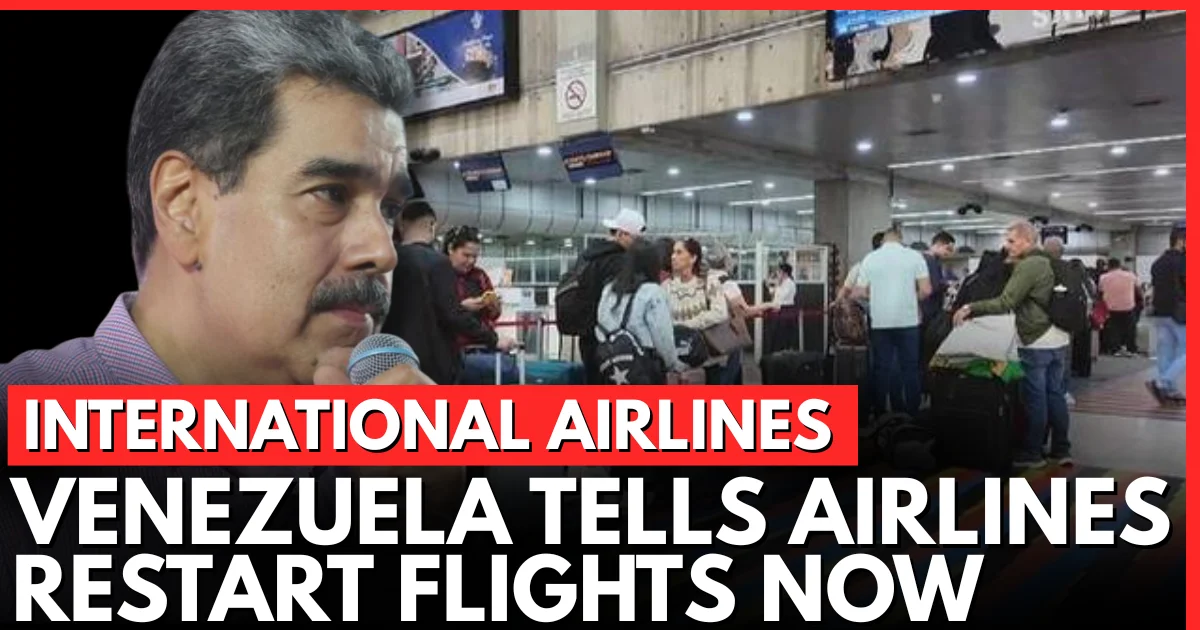Venezuela pushes international airlines to restart suspended flights amid economic and political tensions. What does this mean for travelers? Full story inside.
Table of Contents
Venezuela Demands International Airlines Immediately Resume Suspended Flight Operations
The Venezuelan government has issued a forceful demand to international carriers: restart flights to the South American nation or face consequences. This bold move comes as Venezuela struggles with isolation and seeks to reconnect with the global aviation network after years of declining service.
Venezuela Issues Its Demand
Venezuelan authorities have formally called on international airlines to resume operations to the country. The government argues that flight suspensions lack legitimate justification.
Officials delivered this message through diplomatic channels and public statements. They’ve framed the issue as both an economic necessity and a matter of national dignity.
The demand targets carriers that previously served Venezuelan destinations but suspended operations in recent years. Some airlines departed citing safety concerns. Others pointed to economic unviability.
Venezuela wants them back and isn’t asking politely.
Why Airlines Left Venezuela
Understanding current demands requires examining why carriers departed initially. Multiple factors drove airlines away from Venezuelan routes.
| Factor | Impact on Airlines |
|---|---|
| Economic instability | Currency issues made revenue repatriation difficult |
| Safety concerns | Security situations worried carriers and passengers |
| Political tensions | Sanctions complicated operational logistics |
| Reduced demand | Economic crisis decreased traveler numbers |
| Operational costs | Fuel, maintenance, and staffing became problematic |
At the peak of Venezuela’s aviation connectivity, dozens of international carriers served the country. That number has dwindled dramatically over the past decade.
Major American carriers significantly reduced or eliminated Venezuelan service years ago. European and Latin American airlines followed similar paths.
The Current State of Venezuelan Aviation
Venezuela’s international connectivity has shrunk considerably from previous levels. Limited options remain for travelers seeking to reach the country.
Airlines currently serving Venezuela include:
- Select Latin American carriers maintaining reduced schedules
- Some European operators with limited frequency
- Charter operations serving specific routes
- Regional carriers connecting neighboring countries
Routes that have disappeared:
- Most direct US-Venezuela flights
- Numerous European connections
- Many Latin American hub linkages
- Business-focused premium routes
This reduced connectivity affects business travelers, families separated across borders, and Venezuelan citizens abroad seeking to visit home.
Economic Implications Are Significant
Aviation connectivity directly impacts economic activity. Venezuela’s isolation carries measurable costs.
Business impacts include:
- Trade difficulties — Moving goods requires viable air cargo options
- Investment barriers — Companies hesitate without reliable access
- Tourism collapse — Visitors cannot arrive without flights
- Brain drain acceleration — Professionals leave more easily than they return
- Diaspora disconnection — Millions of Venezuelans abroad lose homeland access
Venezuela’s economy has contracted dramatically over the past decade. Restoring flight connectivity represents one piece of potential recovery efforts.
However, airlines operate as businesses requiring viable economics. Demands alone cannot overcome fundamental market challenges.
What Venezuela Threatens
The Venezuelan government hasn’t limited itself to polite requests. Officials have suggested consequences for non-compliant carriers.
Potential measures mentioned include:
- Revoking future operating rights for airlines that don’t return
- Preferential treatment for carriers that resume service
- Regulatory obstacles for non-compliant companies
- Public criticism of airlines refusing to fly
These threats carry uncertain weight. Airlines already absent from Venezuela have limited vulnerability to such measures.
However, carriers hoping to eventually return might calculate differently. Future market access could matter when conditions improve.
The Sanctions Complication
US sanctions on Venezuela create significant complications for international aviation. Airlines must navigate complex legal requirements.
Sanctions affect airlines through:
| Issue | Challenge |
|---|---|
| Payment processing | Dollar transactions face restrictions |
| Insurance coverage | Policies may exclude sanctioned destinations |
| Parts and maintenance | Supply chains have limitations |
| Corporate liability | Legal risks accompany Venezuela operations |
| Reputation concerns | Associations with sanctioned governments worry stakeholders |
American carriers face the most direct sanctions constraints. However, international airlines using US financial systems or aircraft also encounter complications.
Until sanctions situations change, legal obstacles remain regardless of Venezuelan demands.
Safety Concerns Persist
Beyond economics and sanctions, safety considerations influence airline decisions. Carriers must protect passengers, crew, and equipment.
Ongoing safety factors include:
- Airport infrastructure conditions and maintenance standards
- Air traffic control reliability and capabilities
- Ground handling service quality and security
- Political stability affecting operational predictability
- Crime rates in airport vicinity areas
Aviation safety regulators in various countries issue advisories affecting carrier decisions. Airlines consider these assessments seriously when evaluating route viability.
Venezuela disputes characterizations of safety problems. The government argues international perceptions don’t reflect ground realities.
What This Means for American Travelers
US citizens considering Venezuela travel face a complicated landscape. Limited options and significant advisories shape possibilities.
Current travel considerations:
- State Department warnings — Official advisories urge reconsideration of travel
- Limited flight options — Reaching Venezuela requires indirect routing
- Insurance challenges — Coverage may be unavailable or restricted
- Consular limitations — US diplomatic presence in Venezuela remains constrained
- Safety planning — Enhanced precautions are necessary
Americans with family connections to Venezuela face particularly difficult circumstances. Visiting relatives requires navigating substantial obstacles.
Travel insurance policies specifically covering Venezuela remain difficult to obtain. Many standard policies exclude the destination entirely.
Industry Response So Far
International airlines have responded cautiously to Venezuelan demands. Most carriers appear reluctant to rush back into the market.
Typical airline positions include:
- Monitoring situation for potential future changes
- Requiring improved economic and safety conditions
- Seeking sanctions clarity before committing
- Evaluating demand levels for potential services
No major carrier has announced imminent Venezuela service resumption following the government’s demands. The gap between Venezuelan wishes and airline realities remains substantial.
Industry analysts suggest conditions would need significant improvement before widespread service restoration occurs.
The Diaspora Dimension
Millions of Venezuelans have left their homeland in recent years. This massive diaspora maintains strong connections requiring travel options.
Diaspora travel challenges include:
- Visiting elderly relatives becomes extremely difficult
- Family emergencies lack rapid response options
- Cultural connections weaken without physical visits
- Business ties become harder to maintain
Venezuelan communities abroad have advocated for improved flight options. They represent a substantial potential passenger base if services resumed.
However, diaspora populations often have limited financial resources. Airlines question whether demand would support profitable operations.
Looking Ahead
Venezuela’s demands highlight a broader struggle for international normalization. Aviation connectivity represents just one dimension of this challenge.
Potential scenarios include:
- Gradual service restoration as conditions evolve
- Continued stalemate without fundamental changes
- Political shifts altering the underlying dynamics
- Regional carriers filling gaps major airlines avoid
The timeline for any significant change remains uncertain. Airlines will ultimately make decisions based on business viability rather than government demands.
Venezuela’s path back to full international aviation connectivity depends on factors beyond rhetoric alone.
FAQs
Why did international airlines stop flying to Venezuela?
Airlines suspended Venezuela service due to multiple factors including economic instability, currency repatriation difficulties, safety concerns, political tensions, US sanctions complications, and declining passenger demand. The combination made routes financially unviable for most carriers.
Which airlines currently fly to Venezuela?
Limited options exist for Venezuela flights currently. Some Latin American carriers maintain reduced schedules, certain European operators offer limited service, and regional airlines connect neighboring countries. Major US carriers do not currently serve Venezuela directly.
Is it safe for Americans to travel to Venezuela?
The US State Department maintains travel advisories urging Americans to reconsider Venezuela travel. Safety concerns include crime, civil unrest, poor health infrastructure, and arbitrary detention risks. Travelers who proceed should exercise extreme caution and thorough preparation.
How do US sanctions affect flights to Venezuela?
US sanctions create complications for airlines including payment processing restrictions, insurance coverage limitations, parts and maintenance challenges, and corporate liability concerns. These legal obstacles affect both American carriers and international airlines using US financial systems.
Will airlines resume Venezuela flights soon?
Widespread service restoration appears unlikely without significant changes in economic conditions, safety situations, and sanctions policies. Airlines make route decisions based on business viability. Venezuelan government demands alone cannot overcome fundamental market challenges affecting profitability.
Conclusion
Venezuela’s demand for international airlines to resume flights highlights the country’s isolation and desire for reconnection. However, the gap between government wishes and airline realities remains substantial.
Carriers departed for legitimate business and safety reasons that haven’t fully resolved. Until conditions fundamentally improve, demands alone won’t bring planes back to Venezuelan runways.
Millions of Venezuelans at home and abroad await the day when normal air travel becomes possible again.
Follow our continuing coverage of international aviation developments. Share your thoughts on Venezuela’s situation in the comments below.

